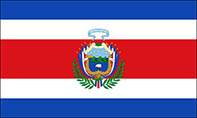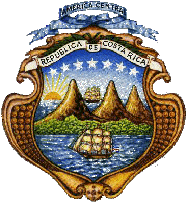Why to invest in Costa Rica


| Costa Rica at a glance | |
|---|---|
| LOCATION | Central America |
| CAPITAL | San José |
| OFFICIAL LANGUAGE | Spanish |
| CURRENCY | Colón |
| POPULATION | 4,758 million inhabitants 2014 |
| AREA | 51,100 km2 |
| POLITICAL SYSTEM | Unitary state with a presidential democratic system |
| GDP | 49.55 thousand million US$ 2014 / 10.415,40 US$ per capita 2014 |
| Source of economic figures: World Bank | |
Due to its political stability and continued economic growth, Costa Rica is considered one of the most efficient areas of Central America de establish commercial and financial relations.
Costa Rica has designed a highly appropriate juridical and fiscal framework that seek to protect equity goods and assets. Moreover, its interest to adapt and integrate in the international regulations, along with its clear and simple internal legislation, lead to it being considered the Switzerland of Central America.
Taxation and Type of Companies
The tax system is based on a criteria of territorial revenue, both for resident natural as well as legal persons, which means that only revenue obtained in the territory of Costa Rica is taxed.
Costa Rica does not have a wealth tax, inheritance or donation tax.
Taxation of Individuals
Personal income tax for natural persons is defined by bands and normally ranges from 0% to 25%, according to the volume of revenue received in the local territory during the financial year.
Taxation of Corporate Entities
The general corporate tax is 30%, although there are lower rates of 10% and 20% for companies that do not obtain a minimum level of profit.
The general Value Added Tax (VAT) rate is 13%.
Features of the Main Types of Costa Rican Companies
There are now various types of companies in Costa Rica; the most common being Stock Companies (SA) and Limited Liability Companies (SRL).
At accounting level, neither the SA, nor the SRL are bound to submit financial statements, although they are required to keep orderly accounting from which the accounting position of the company may be determined.
Limited liability companies have the following characteristics:
| S.R.L. LIMITED LIABILITY COMPANY |
S.A. STOCK COMPANY |
|
|---|---|---|
| MINIMUM CAPITAL | There is no minimum stock capital requisite. | |
| MINIMUM NUMBER OF SHAREHOLDERS | A minimum of 2 shareholders are required at the moment of incorporation. After the company is registered, the quotas or shares may be transferred to a sole shareholder. | A minimum of 2 shareholders are required at the moment of incorporation. After the company is registered, the quotas or shares may be transferred to a sole shareholder. |
| TYPES OF SHAREHOLDERS ALLOWED | Natural or legal person of Costa Rican or foreign nationality. | |
| MANAGING BODY | It may be comprised of a sole manager, although it is possible to appoint various. | Must be comprised of three directors who are natural persons and who shall be appointed as Chairman, Secretary and Treasurer. It is also mandatory to appoint an Auditor, who shall be charged with supervising fulfilment of the legal obligations. |
| SHARES/STAKESS | The stakes are nominative. | The shares are nominative. |
Benefits of the Costa Rican Corporate System
Costa Rica works under a territorial tax system which means that all revenue generated abroad is fully tax exempt.
Conventions
At the end of 2013, Costa Rica signed a convention with the United States to apply the FATCA regulations.
Network of Conventions to Avoid Double Taxation
Costa Rica has signed few doble taxation agreements, and only the one with Spain has entered into force. For additional details, please refer to our summary of double taxation agreements ...
Network of Information Exchange Conventions (IEA)
Costa Rica also has various Information Exchange Conventions (IEA) in force, that are listed below:
| IEAs SIGNED BY COSTA RICA | |
|---|---|
| COUNTRY | YEAR OF ENACTMENT |
| Argentina | 12th July 2012 |
| Australia | 13th December 2012 |
| Canada | 14th August 2012 |
| El Salvador | 30th August 2012 |
| United States | 12th February 1991 |
| Finland | 1st January 2015 |
| France | 14th December 2011 |
| Guatemala | 11th February 2011 |
| Holland | 1st July 2012 |
| Honduras | 11th February 2011 |
| Mexico | 26th July 2012 |
| Norway | 1st January 2015 |
